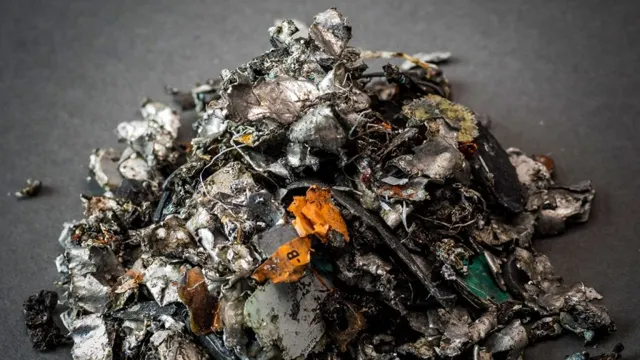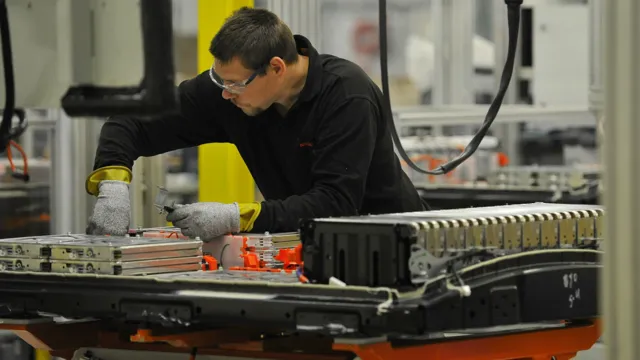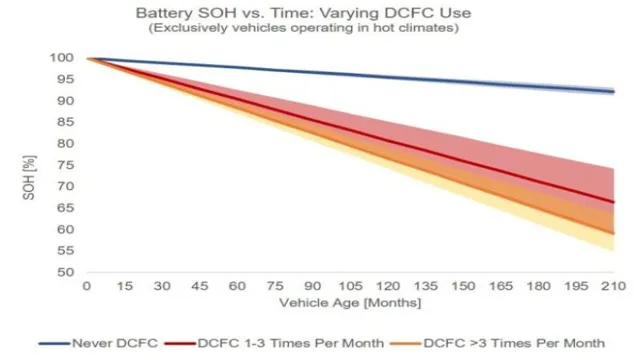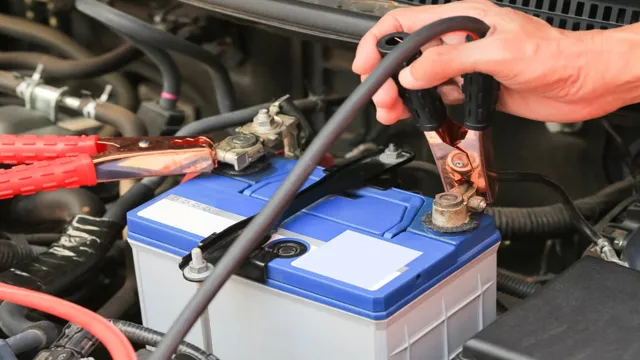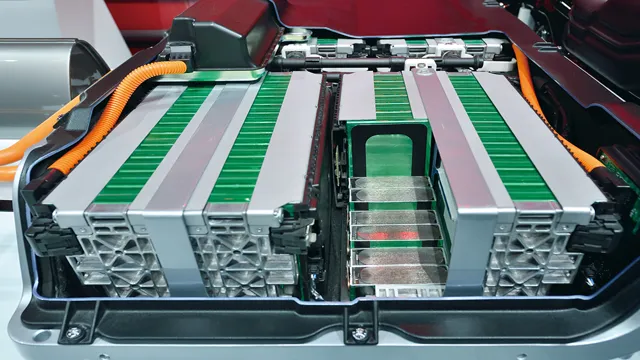Debunking the Myth: Exploring the Impact of Electric Car Batteries on the Environment
Electric cars are often touted as the future of transportation and a key element in the fight against climate change. They are popular because they are environmentally friendly and emit fewer greenhouse gases than traditional combustion engine cars. One of the critical components of these vehicles is the battery.
While electric car batteries provide ample power, there has been concern about their impact on the environment. The question remains: are electric car batteries harmful to the environment? This blog post explores this question and provides insights into the impact of electric car batteries on the environment. Whether you already drive an electric vehicle or are simply curious about these technologies, read on to learn more about the environmental impact of electric car batteries.
Introduction
Are electric car batteries harmful to the environment? This is a common question that people have about electric cars. While it’s true that electric car batteries do have an environmental impact, it’s important to note that they are much less harmful than the impact of traditional gas engines. Electric car batteries contain a mixture of metals and chemicals, such as nickel, cobalt, and lithium.
While these materials can be harmful if not disposed of properly, electric car manufacturers have stringent regulations in place for a proper battery recycling and disposal. Additionally, advances in battery technology have significantly reduced the amount of harmful materials used in electric car batteries. Furthermore, when considering the environmental impact of electric car batteries, it’s essential to remember that the production and use of gasoline-powered vehicles pose a far more significant threat to the environment.
Therefore, electric car batteries may not be entirely harmless, but they are undoubtedly more environmentally friendly than traditional engines.
Defining Electric Car Batteries
Electric car batteries are a crucial component of electric vehicles, and their importance has only increased as the world moves towards sustainable energy. In simplest terms, these batteries are used to store the electrical energy that propels electric cars and make them highly efficient. Unlike traditional gas-powered cars, electric cars use electricity from batteries to generate power for their motors, resulting in zero emissions and better fuel efficiency.
Without these batteries, electric cars would not be able to perform well, and it would not be possible to make long journeys without constantly recharging the car. Thus electric car batteries are the backbone of electric vehicles and are key to the global shift towards a sustainable future.

The Growing Demand for Electric Cars
Electric cars have been gaining popularity in recent years, as more and more people become aware of their environmental benefits and lower cost of ownership. With advancements in technology, electric cars are becoming more efficient and reliable. In fact, many major car manufacturers are now offering electric versions of their popular models.
This growing demand for electric cars has also led to an increase in the availability of charging stations, making it easier for drivers to charge their vehicles on the go. With the rise of renewable energy sources, such as solar power, electric cars are becoming even more sustainable. As we move towards a greener future, electric cars are likely to become an even more attractive option for environmentally-conscious consumers who also want to save money on fuel costs.
Environmental Concerns and Electric Car Batteries
Electric Car Batteries Electric vehicles are gaining popularity worldwide due to their reduced environmental impact and increasing fossil fuel prices. However, an often-overlooked environmental concern is the batteries used in electric cars. While these batteries are crucial for powering the vehicle, they contain chemicals that are hazardous to the environment and human health.
The most commonly used batteries are lithium-ion batteries, which require large amounts of metals like cobalt and nickel along with other rare earth elements. When disposed of, these batteries have the potential to pollute groundwater and release harmful gases into the atmosphere. Additionally, the process of mining and manufacturing these batteries has a significant environmental impact.
As electric vehicles become more prominent, it is crucial to address and mitigate the environmental concerns associated with their batteries to ensure a sustainable future.
Environmental Impact of Electric Car Batteries
Many people wonder if electric car batteries are harmful to the environment. While the production process of batteries does cause some environmental impact, the benefits of electric cars far outweigh the negative effects. Electric cars produce zero emissions while driving, which reduces air pollution and helps combat climate change.
Additionally, electric car batteries can be recycled, which reduces waste and promotes sustainability. In comparison, traditional gasoline cars emit greenhouse gases while driving and require frequent oil changes, which contribute to pollution and environmental degradation. Overall, the environmental impact of electric car batteries is minimal when compared to the benefits they provide for the environment and human health.
So, the answer is no, electric car batteries are not harmful to the environment, and we should encourage the adoption of electric cars as a way to promote sustainable transportation.
Battery Production and Resource Extraction
Electric car batteries have become integral to the growth of the electric vehicle industry. However, their production and resource extraction come with environmental impacts that cannot be ignored. The production of electric car batteries requires the mining and extraction of raw materials such as lithium, nickel, and cobalt.
These materials are often mined from ecologically sensitive areas and can have detrimental effects on the surrounding environment. Additionally, the production of lithium-ion batteries is an energy-intensive process that contributes to greenhouse gas emissions. Despite this, efforts are being made to improve the environmental sustainability of battery production, such as developing more efficient extraction techniques and increasing the use of recycled materials.
As electric vehicles continue to become more commonplace, it is crucial that we continue to find ways to reduce the environmental impact of battery production and resource extraction.
Battery Disposal and Recycling
When we think about eco-friendly alternatives to fossil fuel powered vehicles, electric cars come to mind as the most logical choice. But as consumers, we often overlook the impact of electric car batteries on the environment. While these batteries don’t release greenhouse gases or toxic chemicals during operation, their production and disposal can have serious ecological implications.
Electric car batteries contain metals such as nickel, cobalt, and lithium, which are not only extracted at a high environmental cost, but can also pose a risk to soil, groundwater, and wildlife if not properly disposed of. Enter battery recycling. Recycling these batteries can mitigate the amount of hazardous waste in landfills while also recovering valuable materials for future use.
As consumers, it’s important to make informed decisions and choose brands that prioritize sustainability and responsible battery disposal practices. After all, we’re all responsible for leaving a cleaner, greener planet for future generations.
Comparing Electric Cars and Gas-Powered Cars
One common question when it comes to electric cars is whether their batteries are harmful to the environment. While electric car batteries do contain materials that can be environmentally damaging if not properly disposed of, the overall environmental impact of electric cars is still significantly lower than that of gas-powered cars. This is because electric cars produce zero emissions while driving, unlike gas cars which release harmful pollutants into the air.
Additionally, the materials used in electric car batteries, such as lithium and cobalt, can be recycled and used in new batteries. Governments around the world are also implementing regulations to ensure that the disposal of electric car batteries is done in an environmentally responsible way. Overall, while there are some environmental concerns surrounding the production and disposal of electric car batteries, the benefits of electric cars in reducing emissions and improving air quality make them a more environmentally friendly choice than gas cars.
Carbon Emissions and Air Pollution
When it comes to carbon emissions and air pollution, comparing electric cars and gas-powered cars is essential. Electric cars are known for producing lower levels of carbon emissions compared to gas-powered cars. This is because they run on electricity, which is considered a more eco-friendly energy source.
On the other hand, gas-powered cars emit harmful gases such as carbon dioxide, nitrogen oxides, and volatile organic compounds that lead to air pollution. Moreover, electric cars don’t require oil changes, which means fewer oil spills that can harm the environment. While the initial cost of buying an electric car may be higher than a gas-powered car, the long-term benefits for the environment and our health make it a worthy investment.
By driving an electric car, you are doing your part in reducing carbon emissions and creating a cleaner and healthier environment for future generations.
Mining and Oil Drilling
Mining and oil drilling are two industries that heavily rely on fossil fuels. One of the biggest debates in recent times has been about the pros and cons of gas-powered cars versus electric ones. In terms of mining and drilling, the use of fossil fuels is a huge part of the process.
But with electric cars becoming more prevalent, there’s a growing concern about how it will impact the demand for oil and gas. While electric cars don’t directly use fossil fuels, they still require energy to be produced. This energy often comes from power plants that still use fossil fuels.
However, the advantage of electric cars is that they can be powered by renewable energy sources like solar or wind power. On the other hand, gas-powered cars rely solely on fossil fuels, which not only has an impact on the environment but also on the economy, as oil prices constantly fluctuate. The shift towards electric cars could potentially decrease the demand for oil and gas, which could have a ripple effect on industries that depend on them.
But the transition to electric cars won’t happen overnight, and there will still be a need for mining and drilling in the foreseeable future. Therefore, it’s important to find a balance between sustainable energy sources and industries that rely on fossil fuels.
Conclusion
In conclusion, the answer to the question of whether electric car batteries are harmful to the environment is not a simple one. While there are certainly concerns about the mining and production of raw materials, as well as the disposal of batteries at the end of their lifespan, it is important to remember that these challenges are not unique to the electric car industry. In fact, many of the same concerns have long been associated with other traditional forms of transportation, such as gasoline-powered vehicles.
Furthermore, electric cars offer several advantages over their counterparts, including improved fuel efficiency, reduced emissions, and overall sustainability. Ultimately, it is up to each individual to weigh the pros and cons and decide whether an electric car is right for them. But one thing is clear – as the world continues to move towards alternative modes of transportation, we must remain vigilant in our efforts to minimize the environmental impact of our choices.
After all, it’s not just about the cars we drive – it’s about the planet we share.”
FAQs
Do electric car batteries contain harmful substances?
Yes, some electric car batteries contain toxic chemicals like lithium, cobalt, and nickel that could be harmful to the environment if not properly disposed of.
How do electric car batteries affect the environment during production?
The production of electric car batteries requires significant amounts of energy and produces greenhouse gas emissions. However, the emissions related to battery production are typically offset over time due to the lower emissions of electric cars during use.
Can electric car batteries be recycled?
Yes, electric car batteries can be recycled and have valuable materials that can be reclaimed and reused. Recycling can help reduce the environmental impact of battery production and ensure the proper disposal of toxic materials.
What happens to electric car batteries at the end of their useful life?
Electric car batteries can be repurposed for energy storage or recycled to extract valuable materials. It is important to ensure that batteries are properly recycled or disposed of to prevent negative environmental impacts.

